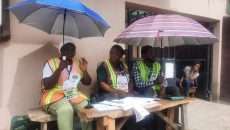While appraising the herculean task ahead of Attahiru Jega, the immediate past chairman of the Independent National Electoral Commission, INEC, I recently wrote in this space that I am nominating the amiable academician as Nigeria’s “Man of the Year” because “my gut instinct tells me Jega will deliver free, fair and credible elections despite all the hiccups.”
In that column I went on to add that: “it must take a special kind of fortitude to wake up every day and look forward to the kind of work he has. But work he must until the elections are concluded because the future of Nigeria literarily depends on how successful Jega and his foot soldiers at INEC perform in the upcoming presidential and governorship elections.”
Four months after that piece, Jega’s tenure at INEC has ended on a triumphant note. This comes after he delivered a successful election that witnessed a first-ever transfer of power from one political party to another despite unfounded widespread trepidation that Nigeria was on the precipice.
Jega rode into the sunset at the end of last month to begin another chapter in a storied professional career that includes stints as the vice chancellor of Bayero University in Kano, a one-time president of the Academic Staff Union of Universities, and a member of the Justice Mohammed Uwais Electoral Reform Committee.
In terms of all his professional challenges nothing could have been more daunting than the task of steering INEC this year through what many consider Nigeria’s most important political transition. Having taken over in 2010 from Maurice Iwu, who conducted the shoddy and highly flawed polls in 2007; Jega built on the gains he made in 2011 by introducing several enhancements including the biometric permanent voter card and the card reader machines for the 2015 elections.
These two new features essentially curtailed the rampant fraudulent practices that had become the hallmark of previous elections, and elevated Jega’s stature among the many technocrats and professionals who have been assigned the task of staging elections in Nigeria. And there have been quite a few electoral commissioners beginning from the very first post-independence Nigerian commissioner Eyo Esua in 1964.
Where many of his predecessors have struggled or failed in the quest for credible elections, Jega excelled. And so now he has raised the bar for his successor.
Soon after Jega’s exit President Muhammadu Buhari appointed the first female INEC head in the person of Amina Bala-Zakari on an interim basis. Because her tenure as a national electoral commissioner at INEC is also due to end soon (on July 21, 2015) it is not certain how long Zakari will be at the helm.
This means that the search is still on for a long-term replacement for Jega. Whoever ends up as the permanent INEC chairman through 2019 must not only match Jega’s competence, non-partisanship, composure (remember Godsday Orubebe!) and integrity. They must implement more innovation ahead of the next general elections. For instance, it will not be too much to ask that the National Identification Number, NIN, which the National Identity Management Commission, NIMC, will make mandatory for all Nigerians by September 1 this year, be integrated into the INEC system as another safeguard against electoral fraud.
The new INEC chairman must also consider integrating Nigerians in the Diaspora into the electoral process for the 2019 elections. In addition to placing emphasis on a robust voter-education system to tackle apathy, the new chairman should also seek ways to avoid a repeat of some of the logistical nightmares that bedevilled the process during the elections in March and April. These ranged from late arrival of polling materials, problems in transporting materials to election stations and poorly trained ad-hoc staff at some of the polling stations.
Perhaps, one of the most important tasks for the new INEC chairman will be to push for the passage of the Uwais report on Electoral Reform. Submitted in December 2008, this report is now gathering dust because of inaction on the part of the federal government and the National Assembly.
In addition to recommending that the INEC chairman should be appointed by the judiciary instead of the president, the Uwais commission also proposed the set up of commissions to deal with electoral offences, constituency delimitation and political parties registration and regulation.
Jega, who was a member of the Uwais commission, continues to advocate for the wholesale passage of the electoral reforms. At a recent farewell dinner held in his honour by the Nigerian Labor Congress, he said, “I think that the task of electoral reforms has not ended. For instance, the Justice Uwais panel has very good recommendations that have not been implemented. I think that there is sufficient time between now and 2019 to ensure that additional reforms are included in the process.”
Even Uwais, who was chief justice of Nigeria from 1995 until 2006, is appalled by the fact that no action has been taken on a report, which his panel labored on for more than a year.
He said recently: “It has become a norm in Nigeria that when committees are set up by government and when the committees submit their reports, the reports don’t normally get fully implemented. That is what has also become of what you call the ‘Uwais Committee Report.”
Regarding talk of conspiracy in approving the establishment of an Electoral Offences Commission with prosecutorial authority which was one of the panel’s recommendations, Uwais said: “I don’t think it is conspiracy as such, but it’s the issue of self preservation. A lot of the politicians who are in the National Assembly, that is the Senate and the House of Representatives, who are to create such a body, are themselves co-offenders, maybe even the brains behind the offences. So, they may feel if they do so, they may be shooting themselves in the foot, and perhaps, that is why they are not keen about implementing that recommendation.”
Follow Us on Social Media


 WhatsApp us
WhatsApp us